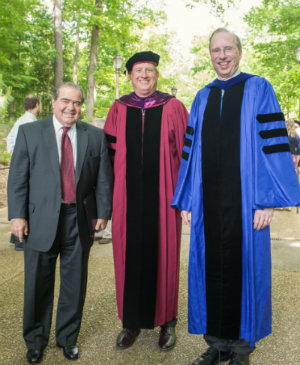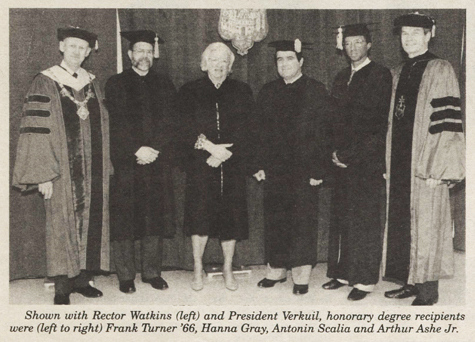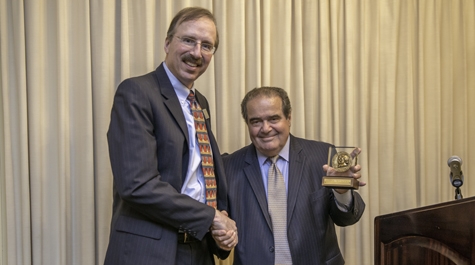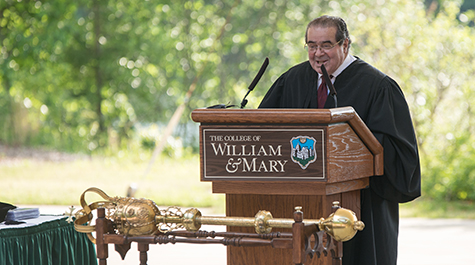Justice Antonin Scalia (1936-2016)
Supreme Court Justice Antonin Scalia, who died on Feb. 13, had many connections to William & Mary, including children and grandchildren who attended the university.
The justice spoke on multiple occasions at the university, particularly at the Law School. He delivered two addresses at Law School Diploma Ceremonies, the first in 1991, and, most recently, on May, 14, 2014.
 In his 2014 Diploma Ceremony remarks, he addressed proposals to shorten the graduate study of law from three years to two, and also addressed what he saw as the root causes for resurgence of the discussion. "You ... have had what I consider not the luxury but the necessity of soaking in the law for three full years," he told Class of 2014 graduates. "Welcome to the ranks of—not tradesmen, but men and women learned in the law." Read Justice Scalia’s prepared remarks. Watch the video of his address (his remarks begin at about 56:00 into the recording).
In his 2014 Diploma Ceremony remarks, he addressed proposals to shorten the graduate study of law from three years to two, and also addressed what he saw as the root causes for resurgence of the discussion. "You ... have had what I consider not the luxury but the necessity of soaking in the law for three full years," he told Class of 2014 graduates. "Welcome to the ranks of—not tradesmen, but men and women learned in the law." Read Justice Scalia’s prepared remarks. Watch the video of his address (his remarks begin at about 56:00 into the recording).
Earlier that day, the justice offered brief remarks at the university's main Commencement ceremony.
The justice relayed advice he had received from his father, a college professor, who told him that “brains are like muscles; you can hire them by the hour. The only thing not for sale is character.” Although the graduates’ parents had been largely responsible for shaping the character of their children, the graduates are now responsible for taking on that job, he said. “It’s a job worth taking seriously, to cultivate the virtues of honesty and courage,” Justice Scalia said. “That is, at the end of the day, what you’ll be tested on.”
The justice gave the university's commencement address in 1996. As reported in the June 1996 Alumni Gazette:
Keynote speaker Antonin Scalia, associate justice of the Supreme Court of the United States, repeated some of the most often heard commencement platitudes—and poked holes in them:
Graduates face unprecedented challenges: "Humanity has been around for at least 5,000 years," said Scalia, "and I doubt that the basic challenges it has confronted are any worse now, or, alas, even much different from what they once were."
Never compromise your principles: "Unless, of course, your principles are flat-out wrong, in which case you would be well advised to compromise them as much as you can."
Education is the most important thing: "It is no accident that the most evil regime of the 20th century (Nazi Germany) … was brought forth by the society that was the most educated…The fact is that the education you have received, the broadening of your mind and intellect, has not made you either happy or good, but has simply increased your capacity for happiness or despair, and for goodness or evil."
This is not an end, this is a beginning: Not true, said Scalia, this is the end of a lot of things, including bills for parents, all-nighters to prepare for term-papers, communal living and a life of leisure.
Honors
 In May 1991 the justice received an honorary degree from William & Mary, presented by Paul R. Verkuil '61, then president of the university. The citation noted that "his impressive career has been marked by a remarkable vigor and extraordinary fidelity to the bedrock constitutional ideal of separated powers" (June 1991 Alumni Gazette). Justice Scalia served as chairman of the Administrative Conference of the United States (ACUS) from 1972-74. Verkuil served as ACUS chairman from 2010-15 (following Congress's revival of the agency after a 15-year hiatus).
In May 1991 the justice received an honorary degree from William & Mary, presented by Paul R. Verkuil '61, then president of the university. The citation noted that "his impressive career has been marked by a remarkable vigor and extraordinary fidelity to the bedrock constitutional ideal of separated powers" (June 1991 Alumni Gazette). Justice Scalia served as chairman of the Administrative Conference of the United States (ACUS) from 1972-74. Verkuil served as ACUS chairman from 2010-15 (following Congress's revival of the agency after a 15-year hiatus).
In September 2012, the Law School faculty recognized Justice Scalia with its highest honor, the Marshall-Wythe Medallion, at the culmination of a daylong visit to the Law School. Read the story. During the justice’s visit, he taught an administrative law class, had lunch with students and faculty, and fielded questions during two informal meetings.
 "When the history of the Rehnquist and Roberts Courts is written, one of the most important chapters will be the one dealing with the jurisprudence of Justice Scalia," said Dean Davison M. Douglas in his remarks at the Medallion presentation. Noting the justice’s renown for his highly influential theory of constitutional interpretation known as textualism, Douglas added that he "writes ... with a spark that makes his opinion in a case frequently the most interesting one to read." Among the most notable Scalia passages the dean cited was the justice's famous likening of the Court's Lemon Test (in Lamb's Chapel, 1993) to a "ghoul ... that repeatedly sits up in its grave and shuffles abroad, after being repeatedly killed and buried."
"When the history of the Rehnquist and Roberts Courts is written, one of the most important chapters will be the one dealing with the jurisprudence of Justice Scalia," said Dean Davison M. Douglas in his remarks at the Medallion presentation. Noting the justice’s renown for his highly influential theory of constitutional interpretation known as textualism, Douglas added that he "writes ... with a spark that makes his opinion in a case frequently the most interesting one to read." Among the most notable Scalia passages the dean cited was the justice's famous likening of the Court's Lemon Test (in Lamb's Chapel, 1993) to a "ghoul ... that repeatedly sits up in its grave and shuffles abroad, after being repeatedly killed and buried."
Law Faculty on Justice Scalia, His Service and Legacy
Ball Professor of Law Alan J. Meese, who clerked for the justice: "The Justice was deeply and fiercely committed to the Rule of Law. He knew that departure from the original meaning of the Constitution or ordinary legislation gave judges and others a license to exercise arbitrary and illegitimate authority over their fellow citizens. Through sheer force of intellect, profound learning, wit and powerful expression, he changed the way that lawyers and judges interpret and thus apply legal texts in our constitutional republic." Read the full text.
Marshall-Wythe Foundation Professor of Law Linda A. Malone: “I have never agreed with anything Justice Scalia has said. I have never lacked respect for anything he has said. What many people may not realize or understand, is that our system benefits from having the best minds argue for the most opposite positions, without discrimination, inflammation, or catering to the worst of our national nature. Justice Scalia did exactly that.”
About William & Mary Law School
Thomas Jefferson founded William & Mary Law School in 1779 to train leaders for the new nation. Now in its third century, America's oldest law school continues its historic mission of educating citizen lawyers who are prepared both to lead and to serve.
